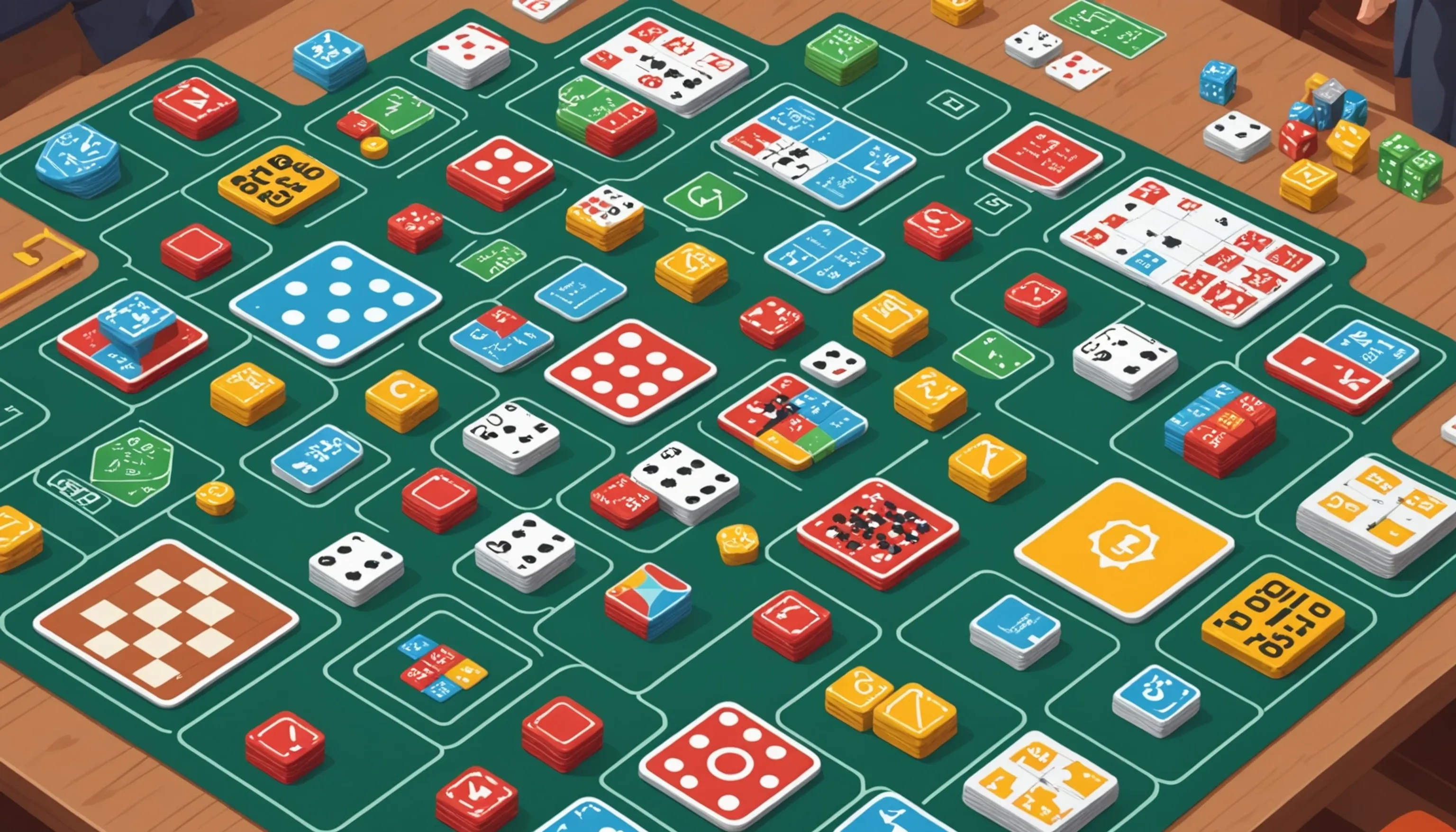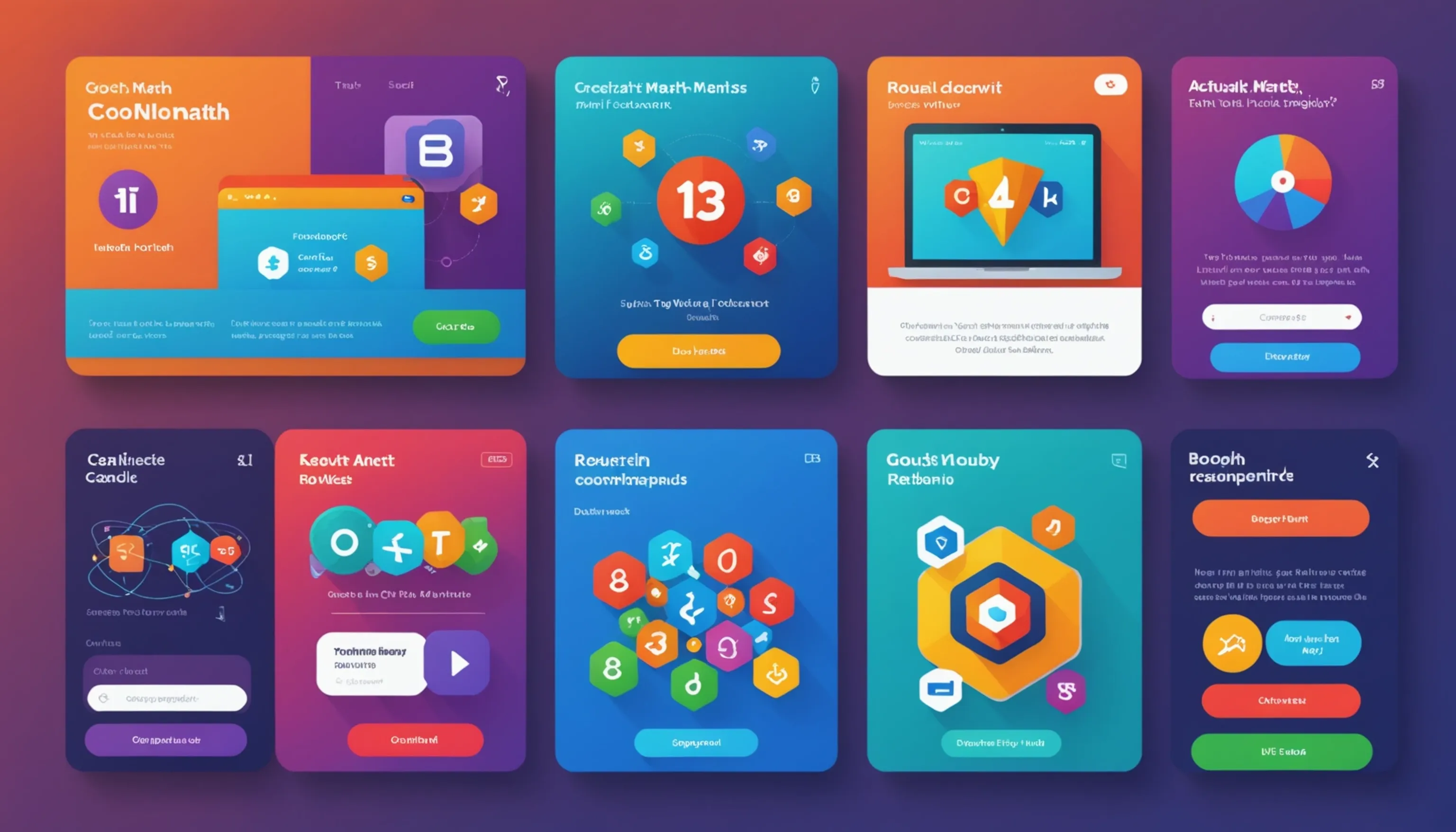Fun Math Games for Teens
 HvWHenry van Wagenberg
HvWHenry van Wagenberg
Fun Math Games for Teens
Engaging in fun math games can transform the way teens perceive mathematics. These games not only make learning enjoyable but also reinforce essential math concepts. From interactive online challenges to classic board games, there’s something for everyone. Games like Math Jeopardy or 24 Game stimulate critical thinking and problem-solving skills. Additionally, group activities promote teamwork and communication among peers.
Incorporating math games into study routines can significantly boost confidence in math skills, making it easier for teens to tackle more complex topics.
Why Math Games Are Beneficial
Math games offer a unique approach to learning that benefits teens in various ways. Firstly, they enhance engagement. Traditional math lessons can often feel tedious, but when math is presented as a game, it captures the interest of students. This interactive learning fosters a positive attitude towards math, encouraging teens to participate actively.
Moreover, math games promote critical thinking and problem-solving skills. As teens navigate challenges within these games, they learn to think strategically. For example, games that require quick calculations or logical deductions help sharpen these skills in a fun environment.
Another significant advantage is the development of social skills. Many math games are designed to be played in groups, which encourages collaboration and communication among peers. Teens learn to work together, sharing strategies and solutions, which can enhance their teamwork abilities.
Additionally, math games provide instant feedback. Unlike traditional assessments, where students may wait days for results, games often offer immediate responses. This allows teens to recognize areas for improvement and adjust their strategies on the spot.
Finally, incorporating math games into regular learning routines can reduce anxiety associated with math. The playful nature of these games helps to create a safe space for teens to practice and make mistakes without fear of judgment. Overall, math games serve as a powerful tool in developing a love for math and reinforcing essential skills.

Types of Math Games to Try
There are various types of math games that can engage teens and enhance their mathematical skills. Here are some popular categories to consider:
- Card Games: Games like Math War and Set challenge players to use addition, subtraction, and pattern recognition skills. These games are perfect for quick rounds and can easily be played anywhere.
- Board Games: Classic board games like Monopoly or Prime Climb incorporate math elements, making them enjoyable for family game nights. These games require players to calculate money, manage resources, and strategize, all while having fun.
- Online Games: Websites such as Coolmath Games and Kahoot! offer a plethora of interactive math challenges. These games often adapt to different skill levels, making them suitable for various ages and abilities.
- Math Puzzles: Sudoku, crosswords, and logic puzzles are excellent for enhancing problem-solving skills. They encourage critical thinking and can be a great way to relax while still engaging the mind.
- Physical Games: Incorporating movement into math, such as scavenger hunts where teens solve math problems to find clues, promotes both physical activity and learning.
Trying different types of math games can keep learning fresh and exciting, ensuring that teens remain engaged while developing their math skills.
Online Math Games for Teens
Online math games for teens provide an engaging platform to develop math skills while having fun. Websites like Kahoot! and Prodigy offer interactive challenges that adapt to individual skill levels. These games often incorporate elements of competition, motivating students to improve their performance. Additionally, platforms such as Coolmath Games feature a variety of puzzles and strategy games that reinforce mathematical concepts in a playful way. With easy access and a plethora of options, online math games are an excellent resource for teens looking to enhance their math skills outside the classroom.

Top Websites for Math Games
Finding the right platforms for math games can enhance the learning experience for teens. Here are some of the top websites that provide engaging math games:
- Coolmath Games: This site offers a wide range of math-related games that focus on logic, strategy, and problem-solving. The games are designed to be fun and engaging, making them perfect for teens who might struggle with traditional math.
- Kahoot! This interactive platform allows teachers and parents to create quizzes and games that make learning math enjoyable. Students can compete against each other in real-time, fostering a sense of community and motivation.
- Prodigy: A popular online math game that adapts to each child's skill level. Prodigy combines curriculum-aligned math practice with a role-playing game format, keeping students engaged while they learn.
- Math Playground: This website features a variety of math games, puzzles, and logic challenges. It's designed for grades 1-6, making it suitable for younger teens or those needing extra practice.
- IXL: While primarily a learning platform, IXL offers interactive math games that provide instant feedback and track progress. This helps students identify areas needing improvement.
These websites not only make math fun but also provide valuable resources for teens to practice their skills in an enjoyable way.
Apps That Make Math Fun
With the rise of technology, there are numerous apps that make math fun for teens, turning learning into an engaging experience. Here are some popular options:
- Prodigy Math: This interactive role-playing game allows students to practice math while embarking on quests and adventures. Prodigy adapts to each player's skill level, ensuring that they are challenged appropriately while having fun.
- Kahoot! App: Kahoot! enables teachers and parents to create engaging quizzes and games that students can play in real-time. The competitive element keeps teens motivated, making math practice feel like a game.
- Mathway: While primarily a problem-solving tool, Mathway provides step-by-step solutions to various math problems. Teens can input their homework questions and learn through the app, making it a valuable resource for understanding concepts better.
- DragonBox: A series of educational games designed to teach algebra concepts in a fun and interactive way. DragonBox uses puzzles and challenges to help students grasp complex topics without realizing they are learning.
- Math Bingo: This app turns traditional bingo into a math game. Players must solve math problems to fill their bingo cards, making it an entertaining way to practice addition, subtraction, multiplication, and division.
These apps not only make math enjoyable but also provide valuable tools for reinforcing important skills, making learning accessible and fun for teens.
Math Board Games for Family Nights
Math board games can be a fantastic way to combine family fun with learning during game nights. Games like Monopoly teach money management and basic arithmetic, while Prime Climb focuses on prime numbers and strategic thinking. Another great option is Math Dice, where players use mental math to score points. These games encourage collaboration and friendly competition, making math enjoyable for everyone. Incorporating math board games into family nights not only strengthens family bonds but also helps reinforce essential math skills in a relaxed and entertaining environment.
Classic Board Games with a Math Twist
Many classic board games can be adapted to include a math twist, making them both entertaining and educational for teens. Here are some popular examples:
- Monopoly: While primarily a game of strategy and finance, players can incorporate math by requiring them to calculate property values, rent, and mortgage payments. You can even create special rules that require players to solve math problems before making transactions.
- Life: This classic game simulates real-life decisions, including career choices and financial management. Adding math challenges, such as calculating salaries or expenses, can enhance the learning experience.
- Scrabble: This word game can be turned into a math challenge by assigning point values based on the length or difficulty of the words formed. Players can earn bonus points for using math-related words, encouraging vocabulary expansion while practicing calculations.
- Yahtzee: In this dice game, players can practice addition and probability as they calculate their scores. You can introduce variations that require players to solve math problems based on their rolls before they can score.
- Risk: A game of strategy and conquest, Risk can include math elements by requiring players to calculate troop strengths and probabilities of success in battles.
By incorporating math twists into these classic games, families can enjoy a fun, interactive way to reinforce essential math skills while spending quality time together.
Creating Your Own Math Board Games
Creating your own math board games can be a fun and engaging way to reinforce math concepts while allowing creativity to shine. Here’s a step-by-step guide to help you get started:
- Choose a Math Concept: Decide which math skill you want to focus on, such as addition, subtraction, fractions, or geometry. Tailoring the game to a specific area helps target the learning objectives.
- Design the Game Board: Use a large piece of cardboard or paper to create your game board. Incorporate a path for players to follow, using spaces that represent different challenges or rewards. You can design the path to resemble a favorite theme, like a jungle or space adventure.
- Develop Game Rules: Establish clear rules for how players can move around the board and interact with it. Determine how players will answer math questions to advance. For instance, landing on a special space could require solving a math problem to proceed.
- Create Game Pieces: Use small objects, like coins or buttons, as game pieces. Alternatively, you can design unique pieces related to the theme of the game.
- Add Challenges: Incorporate various challenges or mini-games that require players to solve math problems or answer trivia questions. For every correct answer, players can earn points or move ahead on the board.
By creating your own math board games, you not only reinforce math skills but also foster teamwork and critical thinking among players. This DIY approach makes learning math an enjoyable experience for everyone involved.
